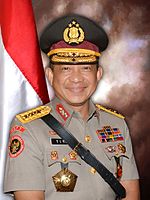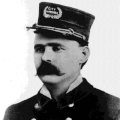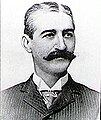Chief of police: Difference between revisions
Djauhari136 (talk | contribs) |
I changed how you got the title of "chief of police just by simply explaining that you are either elected as one or appointed as one |
||
| Line 1: | Line 1: | ||
A '''chief of police''' is the title |
A '''chief of police''' is the title given to an appointed official or an elected one in the chain of command of a [[police department]], particularly in [[North America]]. A chief of police may also be known as a '''police chief''' or sometimes just a '''chief''', while some countries favour other titles such as '''commissioner''' or '''chief constable'''. A police chief is appointed by and answerable to a national or local government, with the main exception being [[Sheriffs in the United States|elected sheriffs in the United States]]. |
||
==Duties== |
==Duties== |
||
Revision as of 23:04, 22 October 2017
A chief of police is the title given to an appointed official or an elected one in the chain of command of a police department, particularly in North America. A chief of police may also be known as a police chief or sometimes just a chief, while some countries favour other titles such as commissioner or chief constable. A police chief is appointed by and answerable to a national or local government, with the main exception being elected sheriffs in the United States.
Duties
The precise role a chief of police has varies by country and sometimes within a country. The larger a police force or department, the more likely that some duties will be delegated to mid-ranked officers. The following list is a general sense of the actions and responsibilities held by any chief of police.
- Oversight of a department's operations and budgeting.
- Oversight of officers.
- Limited disciplinary actions to be addressed on infractions of policy, rules, regulations, laws or ordinances.[1]
- Full dismissal or heavy sanctioning of officer duty; these powers vary by department.
- Promotion and rank placement of officers.
- Production and development of department policies and regulations.
- Liaison with the governments that oversee and fund the department.
- In small police departments, upkeep and updating of department equipment such as police vehicles, weapons, communications equipment and uniforms.[2]
- In the smallest police departments, the chief may also carry out the same duties as regular officers (patrol, investigations, etc.).
Canada
"Chief of police" (French: Directeur) is the most common title for the highest-ranked officer in a Canadian police service. The exceptions are: the Royal Canadian Mounted Police (Commissioner), Ontario Provincial Police (Commissioner), South Coast British Columbia Transportation Authority Police Service (Chief Officer), Vancouver Police Department (Chief Constable), West Vancouver Police Department (Chief Constable), and the Sûreté du Québec (Director General).
In the province of Ontario, Canada, a chief of police must be a sworn police officer and therefore have completed training at the Ontario Police College or have served a probationary period with another recognized police force (such as the Royal Canadian Mounted Police's Academy known as "Depot"). This requirement is legislated in the Police Services Act of Ontario. The legislation states in Section 2 that a Chief of Police is a Police Officer. Section 44.2 of the PSA defines the training requirements. There was a case in the police department of Guelph, Ontario, where a human resource manager was promoted to the position of deputy chief but was required to complete training at the OPC. The candidate is selected by a police services board.
Indonesia

In Indonesia, the Chief of the National Police of Indonesia is often colloquially dubbed: "Kapolri", an acronym of "Kepala Kepolisian Negara Republik Indonesia" meaning "Head of the National Police of the Republic of Indonesia". He is also a four-star ranking officer in the National Police. Candidates who are chosen by the parliament originate from the best chosen three-star ranking officers of the Indonesian National Police, with the president, using his prerogative right, picks one to be the chief. Because Indonesia adopts the system of a unified "national police", the chief of the Indonesian national police holds strong responsibility in policing authorities nationally across Indonesia. The police chief usually conducts strong relations and work together with the Panglima/Commander of the Indonesian Military ("TNI"). In line with the general features of unified structure of local governments, all chiefs of the Indonesian police, in district level ("kapolsek, kepala kepolisian sektor"), municipal level ("kapolres, kepala kepolisian resor"), and provincial level ("kapolda", kepala kepolisian daerah) in Indonesia, are subordinates of Kapolri, the Indonesian National Police Chief.
United States
Alternate titles for a chief of police include police commissioner, colonel (in the Rhode Island State Police), police superintendent and police president. A sheriff is the chief of a county law enforcement agency. Some sheriff's offices have the powers and role of a police department, while others are limited to non-policing matters such as courtroom security.
In contrast to a sheriff (who is generally elected by the voters of a county, except in the states of Rhode Island and Hawaii),[3] a chief of police is usually a municipal employee who owes his allegiance to a city or town. Some states have both an appointed and an elected chief of police (Louisiana). Some departments are led by a civilian overseer, usually referred to as commissioner. The New York City Police Department is one such case, where the chief (full title: Chief of department) is the most senior sworn officer. In Louisiana, a chief of police may serve as the chief of police, marshal, and constable of a city. The fraternal organization International Association of Chiefs of Police (IACP) is an organization that many chiefs of police are associated with.
Many state constitutions require every county to have a sheriff; some make no provision for this position to be eliminated even in the case of the formation of a Consolidated city–county or "metropolitan government". In this case, a decision must be made about how to divide the powers between the county sheriff and the city's chief of police. The usual compromise allows the chief of police to exercise law enforcement jurisdiction and to give the sheriff and his deputies authority over jails and the serving of civil papers. An alternative and lesser-used solution is to make the office of sheriff a purely ceremonial one. One other solution, an example of which is seen in the case of the Las Vegas Metropolitan Police Department, is to provide for the sheriff to simultaneously serve as the chief of police, thus remaining as the chief law enforcement officer (CLEO) of the county.
The police chief of a small town may be the only paid employee of the police department and have a staff consisting only of volunteers when available. Conversely the police chief of a major city may have thousands or in the case of very large cities such as New York, 35,000 sworn officers. Further than that they will have thousands more civilian employees under his command including operators, secretaries, and unsworn peace officers. It is obvious that the qualifications and skills required to be a police chief vary widely. Another important consideration is how overtly a police department is influenced by politics which varies greatly from one jurisdiction to another. Increasingly, all U.S. law enforcement officers including small-town police chiefs and their charges are being required to meet at least minimum levels of professional training.
United Kingdom
In the United Kingdom, the chief police officer for 43 of the 45 territorial police forces and the 3 special police forces holds the rank of Chief Constable. The exceptions are the Metropolitan Police Service and City of London Police, where the chief police officer instead holds the rank of Commissioner. The umbrella term for the chief constables and commissioners is chief police officer. The term "chief officer", by contrast, includes the chief police officers and their deputies and assistants. The National Police Chiefs Council is the association for chief officers.
The rank of Commissioner should not be confused with the Police and Crime Commissioners. They are elected officials who oversee a police force and how its funds are spent, rather than being police officers.
Personnel
-
Ft Worth Texas City Marshal Jim Courtright 1876-1879 -
El Paso Texas City Marshal Dallas Stoudenmire 1881-1882 -
Austin City Marshal Ben Thompson a predecessor to the Austin Police Department 1881-1882 -
New Orleans Superintendent/Chief of Police David Hennessy, 1889-1890 -
NYPD Superintendent/Chief of Police William S. Devery 1898-1902 -
Chicago Police Chief James O'Neill 1901-1905 -
Oklahoma City Police Chief Bill Tilghman 1911-1912
See also
References
- ^ "SECTION 200.010: CHIEF OF POLICE - DUTIES - SALARY". Retrieved 2009-10-04.
- ^ "Municipal Code". Archived from the original on 2011-05-05. Retrieved 2009-10-04.
{{cite web}}: Unknown parameter|deadurl=ignored (|url-status=suggested) (help) - ^ "About NSA". Archived from the original on 2010-01-10. Retrieved 2009-10-01.
{{cite web}}: Unknown parameter|deadurl=ignored (|url-status=suggested) (help)






